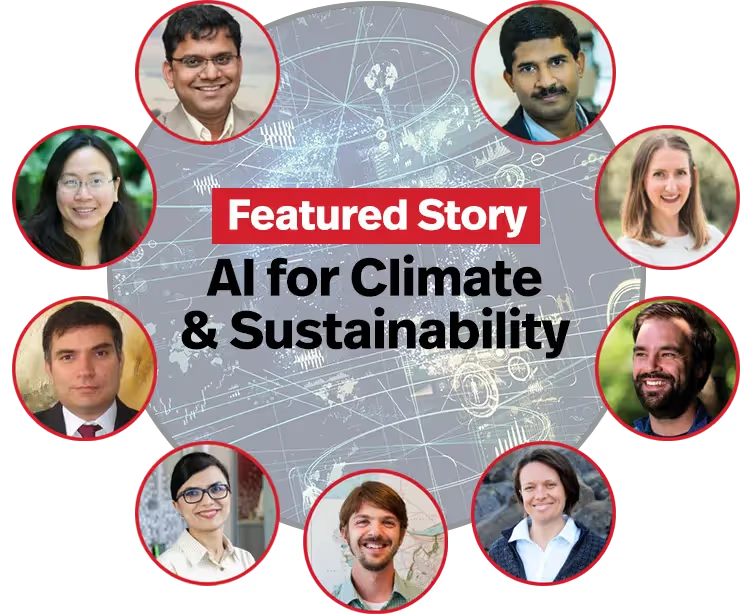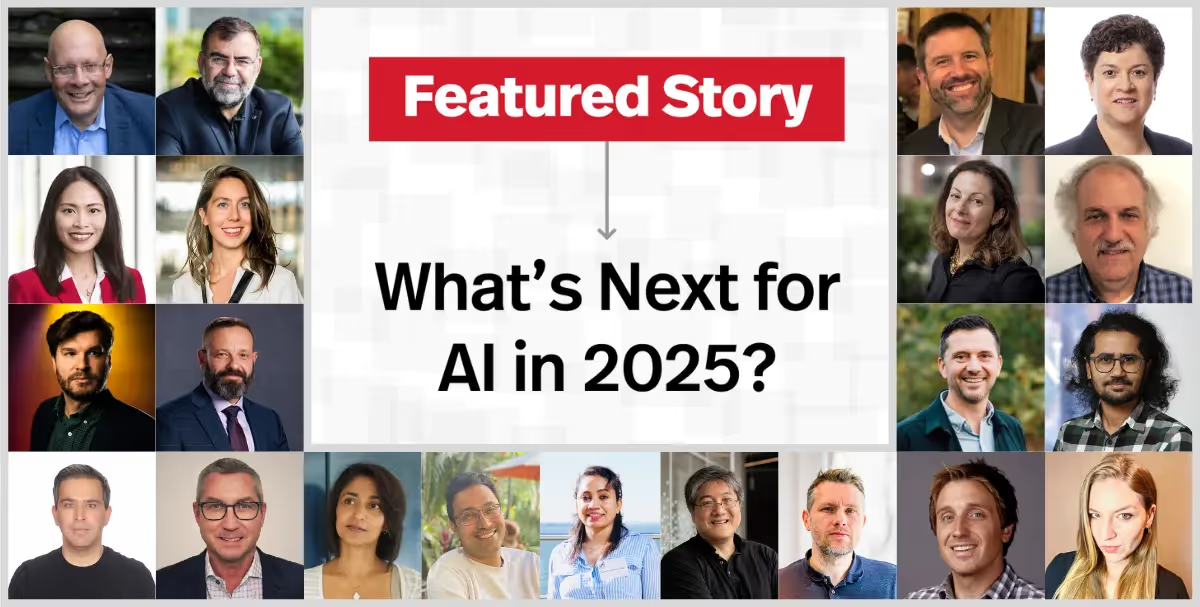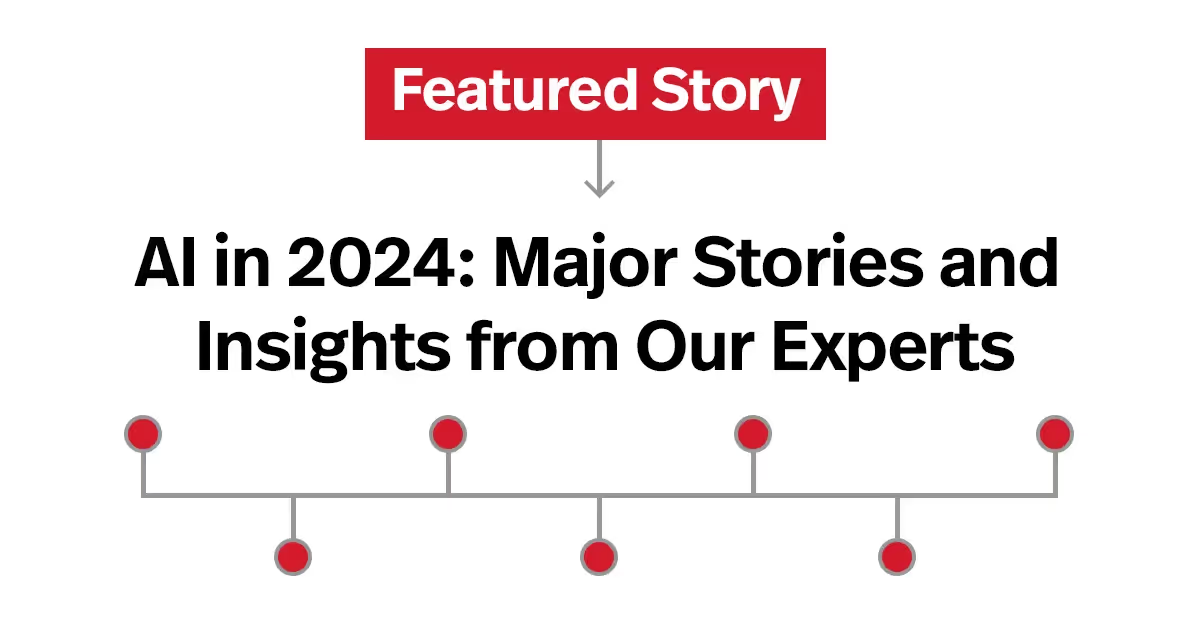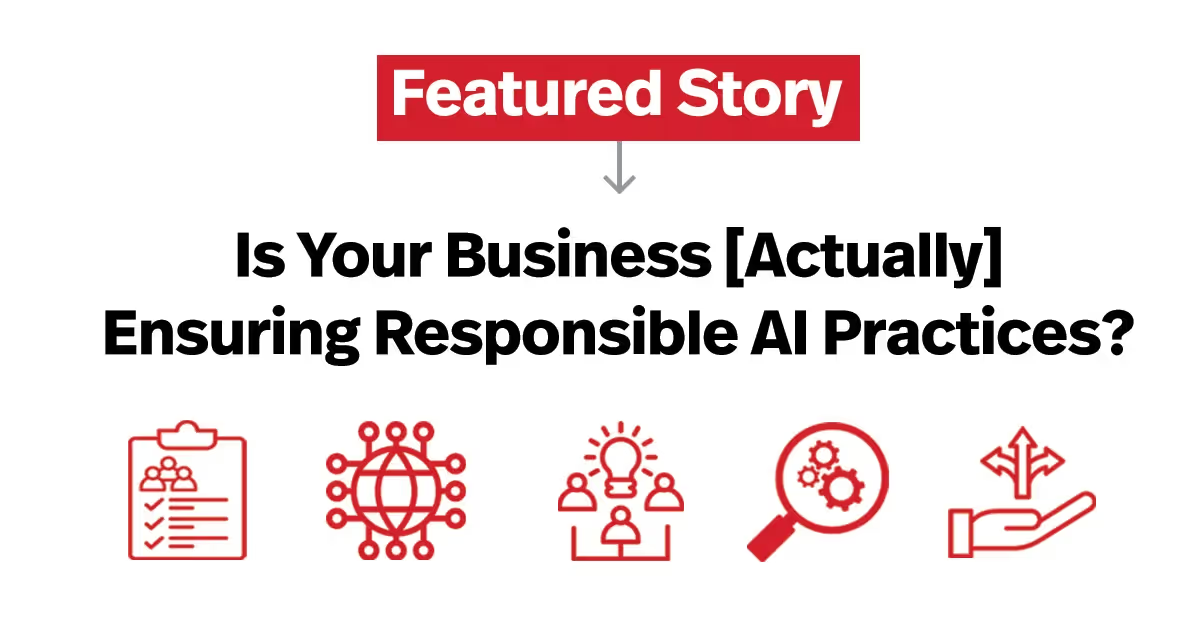AI for Climate and Sustainability

Vast quantities of data underpin the AI revolution, but there are still areas where data is sparse. Climate science is a good example. While there is plenty of data to be found, their value depends on a deep understanding of historical patterns, extreme values, privacy concerns, and natural systems—to say nothing of the complex web of interactions between weather, food networks, ecosystems, energy grids, and infrastructure.
AI for Climate and Sustainability (AI4CaS), a new focus area of the Institute for Experiential AI, is at work bringing novel analytic methods to bear on the most pressing problems in climate and sustainability. This Earth month, we hear from six experts on the promises and challenges in the field.
For Earth Month, we hear from Northeastern University experts on the promises and challenges of AI for climate and sustainability:

"Our work at the intersection of machine learning, nonlinear dynamics, network science, process-based modeling, and extreme value theory are well positioned to bring together Big and Small data for better understanding of complex and interconnected spatiotemporal systems. AI has been called the new electricity and a game-changer. Whether the promise fully pans out, it is clear that AI will have an impact on societal priorities and the workforce of the future. The power that AI may give to a few, not all of whom may be working for the common good, could significantly skew the landscape of equity, with implications for climate and sustainability, among other areas such as healthcare, warfare, and manufacturing automation."
- Auroop Ganguly, director of AI for Climate and Sustainability, Institute for Experiential AI, College of Engineering, Khoury College of Computer Sciences

"My research is in foundations in machine learning (ML) and AI. ML can be applied to many applications. I focus my work on applications that benefit society. Climate change is an important problem of our times. ML and AI can help in making better climate projections at local scales to aid decision-makers and planners to prepare for projected impacts. Climate adaptation is a very interesting problem with very challenging data. It’s spatiotemporal and non-stationary, nonlinear, with teleconnections, and at different scales. Standard learning algorithms work well on predicting averages, but in climate, we have to make predictions on rare events, where we do not have a lot of data samples. Challenges enable innovation and inspire us to push the state-of-the-art in ML and AI."
- Jennifer Dy, director of AI faculty, Department of Electrical Engineering, Khoury College of Computer Sciences

"AI plays a crucial role in addressing climate resilience, building efficient energy transitions, and conserving ecosystems. When combined with domain knowledge, AI acts as a powerful bridge between climate science and applied technology. This synergy enhances our understanding of climate change and paves the way for practical solutions and strategies. Advances in forecasting future climate scenarios with greater accuracy and AI-enabled early warning systems save lives and infrastructure and allow planning and designing for mitigation and recovery. AI supports research in new energy technology technologies and for optimizing energy infrastructure. I believe that perhaps the greatest value would be in supporting the conservation of ecosystems, identifying at-risk areas, and prioritizing conservation efforts."
- Ardeshir Contractor, director of strategic projects, AI for Climate and Sustainability

"Transportation is a major contributor to climate change. AI offers a powerful tool to tackle sustainability challenges by enabling the analysis of vast amounts of traffic data, replicating real-world systems through digital twins, allowing to account for the impact of different (societal, environmental, economic, etc.) factors in the entire transportation system, leading to the design/redesign of sustainable systems that work for all. In our group, we develop AI-based intervention strategies for the design of smarter transportation systems. Our human-centric approach accounts for accessibility, affordability, and fairness, ensuring that our interventions not only optimize traffic flow but also promote social and environmental justice. As we strive to shape a more inclusive and eco-conscious urban environment, it is essential for the public to engage in discussions about the responsible deployment of AI technologies, nurturing their trust in the transformative potential of these innovations."
- Fatemeh Ghoreishi, assistant professor of civil and environmental engineering, Khoury College of Computer Sciences

"AI has promise to improve species management and restoration under climate change. AI canprovide scientists with predictions on how to prioritize species and individuals for restoration efforts, such that the population will be pre-adapted to climate change. However, the development of these AI models are in their infancy, and scientists are currently evaluating what kind of biological information (e.g., genomic and ecological data) is needed for accurate predictions."
- Katie Lotterhos, associate professor at the Marine Science Center for the Department of Marine and Environmental Sciences

"Each community experiences environmental hazards through its own unique landscape of heat "islets", pockets of pollution, puddles and ponds of flooding, and more. AI offers the promise of applying climate models to these hyperlocal concerns. The result is a technology that can empower communities to observe current and future threats, advocate for critical supports, and design solutions that are tailored to their lives."
- Daniel O’Brien, professor of public policy, College of Social Sciences

“Dr. Auroop Ganguly and the work he does in his lab is truly inspirational and groundbreaking both to students and the resilience industry as a whole. His work on climate change, sustainability, and resiliency is what introduced me to the security and resilience field, where I have built my career in the public and private sectors. The work done by him and his lab, as evidenced by the SERDP NICE project as well as his work with AI4CaS, complements resilience practitioners and provides innovative research and forward momentum for such an important discipline. We can all learn from Dr. Ganguly and his passion for his work and his students!"
- Rose Leopold, director of business resilience at Moderna, Northeastern University BS '16, MS '17

"AI/machine learning approaches hold tremendous potential for climate science. These approaches can help us to sort through the large datasets being produced by climate and weather models more efficiently. One challenge will be that future climates will increasingly diverge from historical ones, and so we must exercise caution in using AI/ML methods in assessing future changes in the climate system."
- Samuel Muñoz, associate professor of marine and environmental sciences, College of Engineering

"AI can be used to develop more efficient renewable energy sources, such as battery management in EVs; create new agricultural technologies, like watering algorithms; improve access to healthcare through AI-powered self-diagnostic tools; and help workers transition to new jobs with skill-gap remedial systems. The main challenge is that many environmental problems require a fundamental change in human behavior, and that we will distract ourselves with things like AI, EVs, quantum computing, to avoid dealing with leading issues like ecological collapse. But there is opportunity in crisis."
- Ravi Sundaram, professor, Khoury College of Computer Sciences
Find out how the AI for Climate and Sustainability (AI4CaS) focus area partners with organizations to address the use of AI for climate prediction and more.




